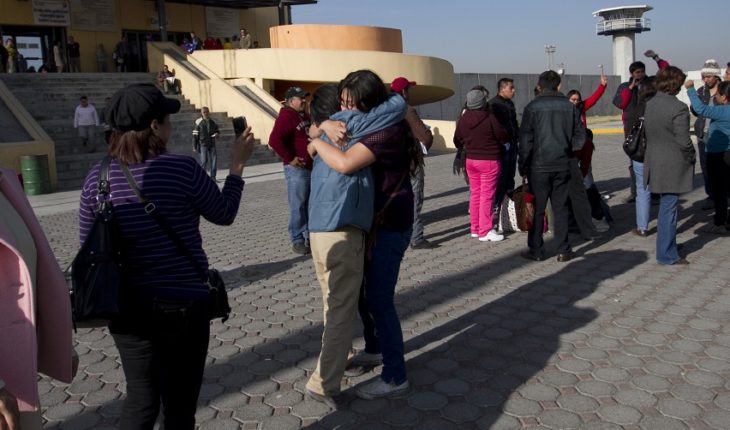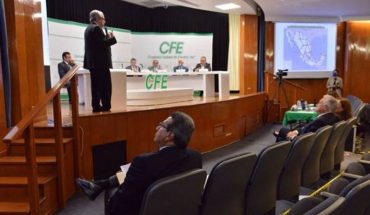Bety Maldonado was selling drugs on his doorstep. She had been at it for six months when she was arrested. About 150 elements of the Federal Bureau of Investigation (AFI) arrived, surrounded the family private where their home was located, and arrested 22 people, including family members and even neighbors.
It was March 2010. He was given six years in prison. First they took her to Santa Martha Acatitla. But former President Felipe Calderón had started his war on drugs, and those who were imprisoned for health crimes were to be in a federal prison.
Bety was transferred to the Marias Islands in October 2011. “There, the Federal Police officers made it known to me that I was worth less than a stone, i.e. that I was a criminal, so I couldn’t dare or look them in the face. In its wake, the inmates had to bow their heads.”
From the year he was there — before one of the various shelters he brought in to get back to St. Martha was effective -the hardest thing was not seeing his family. I could only call them once every fortnight. And that’s only if he behaved well and didn’t accumulate three bad points.
In the Marias Islands, it took five more minutes to shower or show up with hair and wet clothes for breakfast to earn those points, it did not matter that the inmates should play the bath with 40 other companions. Bety took pains to abide by all the rules to be allowed to make the call, because for her, she says, her family comes first.
It was when he decided to sell drugs. Her husband was addicted and had accumulated a debt to a criminal group. They came to find him to his house to charge him, but they didn’t find him, he had been hiding in a tub. They found only Bety, their daughter and their three-year-old granddaughter.
The child was held and shot. They were told that if they didn’t pay the debt, the family was going to “stand up mother.”
“We didn’t doubt that, at that time, in the neighborhood (in Azcapotzalco) all over the place, they knew about dead people, of account adjustments,” bety Bety said.
With the work he had in the afternoons in the cellar of a backpack company, where he accommodated the product, and what he took from the taco stand he attended in the morning, Bety could not pay the amount demanded by the criminals. He decided to start selling drugs. “I went two days after them and told them I would pay.”
She had already managed to resettle half the debt when the AFI came to stop it. “It was a huge operation, as if I had been a great drug dealer and so I was punished, the Marias Islands was an excess, that almost killed me, there were times when I was just looking for something to hang me with.”
Bety was worried about someone in particular. “I was very desperate not to be with my youngest son, I was 15 when I was arrested, as they also took their dad, who was also addicted, he was left alone. My son wanted to study law, but he couldn’t anymore. He had to work and take care of himself.”
When drug trafficking is punishable by imprisonment, Bety says, “not just one crime is being punished, poverty, ignorance, lack of opportunity are being punished. And the family is also punished, most of the women in prison are the pillars of that nucleus.”
Ana Pecova, director of the civil society organization Equis Justice for Women, explains that when the war on drugs was launched, in calderón’s sex-year period, people with little drugs were detained and imposed exemplary punishments, such as sending them to women to the Marias Islands.
“It was an attempt to send the message that these crimes would not be tolerated. But it was not the great kingpins who ended up in prison, the prisons were filled with women who worked, out of necessity or threat, in the lower links of criminal networks.”
The Washington Office for Latin American Affairs (WOLA) and Equis Justicia para las Mujeres have documented that in Mexico there are 3,18 women incarcerated or in criminal proceedings for health crimes. 2 thousand 777 of them are in local prisons and 241 in federal. In the last two years, the number of women who have been admitted to prison in the common jurisdiction for health offences has grown by 103.3%.
Accused women who engage in these crimes are generally poor, uneducated, and solely responsible for their sons and daughters.
Some of the activities they carry out are: the transfer of narcotics; the planting, harvesting and/or cultivation of poppy or marijuana; packaging of illegal substances for transfer and drug protection in their homes.
For the most part, these women were victims of human rights violations. Only 1.3% were arrested with an arrest warrant by the Army. Federal authorities, especially the Navy, used physical force and firearms to subdue them.
Pecova argues that we should ask ourselves, what’s the point of having these women in jail? “They are not a danger, they are for non-violent crimes, and organized crime groups easily replace them, their imprisonment does not affect the operation of drug trafficking. They only expose them to more violations of their rights, and they also have a negative impact on their families and are taxed for having them in jail.”
The other state fault
Abigail Sanchez was eight days old when her mother left her with her grandmother. They lived in a wooden and cardboard house. He hardly went to school. For her a hot dog was a bread and gravy. She knew the pizzas only because her neighbor left her the banks she didn’t want to eat, and that she would throw her up from the roof so she would have to lift them off the floor if she wanted them.
Added to poverty were Grandma’s frequent blows. Abi suffered sexual abuse in his teens and lived on the street for some periods. Then he went to live with a man. But her financial condition did not improve, he gave her 100 pesos a week to solve the expenses of her and three children. There was no frills or pizza.
At that time too, the blows were added to the gaps. Abi’s partner began to mistreat her. She would defend herself when she could and on a couple of occasions even threatened him with a knife. They separated, but the man convinced the children to go with him to live with his paternal grandmother, who owns a small grocery store. Abigail was left alone and out of money. He joined another man, who didn’t earn much in his job as a bricklayer.
Abi looked for jobs, but he always had a low salary. He’s fed up. His own sister offered to “work” by introducing drugs to prisons. He was at it for almost a year. “With what I earned I was able to go to eat at a restaurant, buy clothes, candy, have someone to do me the cleaning, all that for some it is so easy, but for me not. Until they learned me and ended up in Santa Martha.” It was April 2013.
He was in prison for five years. He left barely an eight months ago. While she was in jail, the man she was living with when she started introducing drugs to the criminals was also arrested, charged with kidnapping.
On his visits to prison, he befriended another inmate’s partner. “The man asked him to rent him a room where we lived and my husband said yes, as I was not there and he spent many days with my sister-in-law, that person used the room to put there a boy he kidnapped.”
Police arrived at the house one day and the husband was involved in the kidnapping. During his time in prison, he passed away, allegedly from peritonitis, “I’m sure he was kicked in the stomach to death,” Abi says.
With her husband dead, and unable to approach their children, because their former partner wouldn’t let him, Abigail got out of jail without having any relatives to turn to. “Whoever offered me her house to stay was a dance teacher I met here in the penitentiary, he had me there for eight months without taking a weight. If I have a job, it’s because two former Santa Martha classmates got me a job cleaning a house.” Women get to drug trafficking because of poverty and leave prison more vulnerable.
That’s the other problem, women get out of prison on a much more vulnerable condition than the one they entered. “Women were very alone in prison. Out of ten sentences, one-third are never visited. The same percentage comes out with nowhere to go. They take them out in the middle of the night, without a weight and without anyone waiting for them,” says Natacha Lopvet, founder of the Network of Justicieras, an organization that was created as a space of coexistence and support among former recluse.
It’s the state’s other fault for women in prison. “For us there are no halfway houses, for example, in several cases it is the former companions who are waiting for you outside and see where to take you, in the network we do that, because we know that many have not even where to go.”
The AMNESTy of AMLO
The Amnesty Law initiative presented by Andrés Manuel López Obrador will benefit women who are in prison for owning, transporting, selling, cultivating or introducing narcotics to the country, provided that they have not committed blood or violence crimes, and that they are not Recidivists.
“But there are several that are (up to 8% according to data from the National Free Private Population Survey, ENPOL 2016). There are drug users who had prior contact with the justice system but let them go, reoffended and just entered the prison, they do not qualify for amnesty,” Pecova explains.
Find out: What yes and what does not propose the Amnesty Act sent by AMLO to Congress
In addition, the activist points out, the reintegration part is absent from this bill. “It’s not just the question of getting them out of jail, they need accompaniment so they don’t re-instate, to treat their addiction if they’re users. If that’s not it, the law remains a quick fix, like a patch, but it won’t be effective or durable.”
Both Pecova and Lopvet emphasize the need for a public policy that accompanies women when they leave prison. “They go out even without their documents, take months to recover their NSOs, how they are then going to rent a room, find a job, get their children back if they’ve lost custody, if they don’t even have the basic papers,” Pecova asks.
Faced with this problem is that WOLA and Equis Justicia launched the campaign #LiberarlasEsJusticia Context is the only difference, in which three proposals are made to the Mexican state:
1. Establish a legal mechanism for the release of women who are incarcerated and who have been victims of drug policy, many of whom are vulnerable. The proposition is to get them all out.
2. Implement comprehensive social reintegration strategies, so that women have more life choices.
3. Move to comprehensive drug policies that prioritize public health and women’s human rights.
What we do in Animal Político requires professional journalists, teamwork, dialogue with readers and something very important: independence. You can help us keep going. Be part of the team.
Subscribe to Animal Politician, receive benefits and support free journalism.#YoSoyAnimal
translated from Spanish: Women reach narco from poverty and leave prison more vulnerable
September 24, 2019 |





